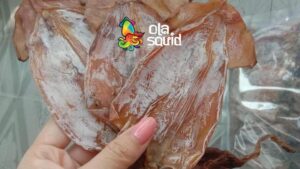Squid is one of the familiar seafoods, favored for its naturally sweet flavor, distinct chewy texture, and versatility in cooking. Beyond being an ingredient for dishes, the con mực also offers numerous nutritional benefits for health. So, what are the specific benefits of eating squid, and is eating too much squid good for you? To learn more, please read the article below!
1. Understanding the Squid
The squid is a soft-bodied marine animal belonging to the class Cephalopoda, inhabiting a wide range from shallow waters to the deep ocean. Unlike octopuses, squids possess ten flexible tentacles, a characteristic flattened cylindrical body, and an ink sac that allows them to eject a cloud of ink to create a protective screen when in danger. Thanks to their powerful water-jetting mechanism, squids are capable of swimming fast and moving agilely, making them adept predators in the marine environment.

Squids have a flattened cylindrical body, tentacles (arms), and an ink sac for defense. Common types include squid, cuttlefish, and octopus, each differing in shape, size, color, and meat texture. Among squids, the colossal squid, Architeuthis, with tentacles up to 16 meters long, is one of the most powerful invertebrates on the planet, with strength comparable to that of a sperm whale.
Larger squids, often found in deep, offshore waters, are typically caught by using lights to attract them closer to the surface. Smaller squids, found closer to shore, are often caught using multi-hook fishing rods mounted on small boats. After being caught, squids are carefully preserved and neatly arranged to prevent damage from tentacle friction, ensuring their fresh appearance is maintained.
See more: What is Dried Squid in English? Names of Dried Squid Dishes
2. Benefits of Eating Squid
Squid is a highly nutritious seafood, notably rich in protein. It also contains low calories, about 104 calories per 100g, with almost no fiber or saturated fat. In addition to protein, squid provides essential vitamins and minerals such as vitamin C, vitamin B12, riboflavin, iron, calcium, copper, phosphorus, and selenium. Notably, squid is low in sodium and cholesterol, making it suitable for a healthy diet.
Here are the outstanding health benefits of incorporating squid into your diet:
- Provides a Rich Source of Protein: 100g of squid contains up to 18g of protein – equivalent to beef or fish – which is effective for building and regenerating tissues and muscles.
- Good for Cardiovascular Health: Squid contains high amounts of DHA (a type of omega-3) and potassium, which help stabilize heart rate, reduce blood lipids, and lower the risk of cardiovascular diseases.
- Supports Healthy Pregnancy: Rich in iron and protein, squid is particularly beneficial for pregnant and breastfeeding women, helping to boost blood count and strengthen immunity.
- Boosts the Immune System: With its content of selenium, vitamin C, and vitamin B12, squid helps the body fight bacteria, viruses, and enhance natural immunity.
- Anti-inflammatory and Supports Joint Health: Squid has anti-inflammatory properties due to its selenium and omega-3 content, and it also helps reduce pain caused by arthritis.

- Stabilizes Blood Pressure: The high potassium content in squid helps regulate blood pressure and reduces the risk of stroke.
- Promotes Strong Teeth and Bones: The phosphorus, magnesium, and calcium in squid are essential for bone development, especially in children and the elderly.
- Supports Red Blood Cell Production: Squid provides up to 90% of the daily recommended intake of copper and contains vitamins, helping to protect and maintain healthy red blood cells.
- Stabilizes Blood Sugar: With low saturated fat, high protein, and minerals, squid naturally helps balance blood sugar levels.
- Good for the Digestive System: Thanks to B vitamins and natural digestive enzymes, squid aids in better metabolism and reduces bloating and acid reflux.
3. Potential Risks of Eating Too Much Squid
Although squid is a nutritious food popular in many meals, excessive consumption or improper preparation can lead to several health risks:
- Risk of Seafood Allergy: Squid contains tropomyosin, a protein that can easily cause allergic reactions in individuals sensitive to shellfish. Those with a history of allergies to shrimp, crab, clams, etc., should avoid or be cautious when eating squid.
- High Cholesterol Content: Squid meat contains a considerable amount of cholesterol. Frequent consumption, especially in fried forms, can affect the cardiovascular system, particularly in individuals with pre-existing conditions such as hypertension or high blood lipids.
- Risk of Mercury Accumulation: Although classified as a seafood with low mercury levels, squid can still contain a certain amount of heavy metals due to marine pollution. Eating too much squid over a long period can increase the risk of mercury poisoning, which is particularly dangerous for pregnant women and young children.

- Food Safety and Hygiene Issues: Raw or undercooked squid can carry harmful bacteria and parasites that affect the digestive system. Conversely, overcooking can make the squid dry, tough, and lose its natural flavor.
Therefore, adults should consume squid 2-3 times per week, with each serving around 100g. Children aged 2 to 11 should limit their intake to about 30g per serving to ensure health safety.
4. How to Choose Fresh and Delicious Squid
To prepare delicious and food-safe meals, choosing fresh squid is paramount. Here are some helpful tips to easily identify and select quality squid:
- Fresh squid typically has a shiny surface with clear colors. Squid will have a natural light brown or translucent color. If the squid’s body turns opaque white, dark, or dull, it may be a sign that it has been stored for too long.
- The eyes of fresh squid will be clear and bright, with visible pupils. Cloudy or sunken eyes indicate the squid is no longer fresh.
- You can gently press the squid’s body with your finger. If the flesh feels firm, elastic, and not mushy or watery, the squid is fresh.
- Fresh squid will have a mild sea aroma, not a strong fishy or unpleasant odor. If you detect any strange smell, sliminess, or signs of decomposition, do not purchase it.
- The tentacles should be firmly attached to the body, with all tentacles intact, not detached or limp. This is a small detail but easily indicates freshness.
- Prioritize choosing live squid or squid that has been properly deep-frozen. If buying frozen squid, select products with clear origin labeling, a valid expiration date, and no signs of damage.
5. Where to Buy Quality Squid?
To enjoy delicious, safe, and fresh seafood dishes made from squid, choosing the right place to buy is crucial. Here are some recommendations to help you find a reliable source of squid:
- Seafood Markets in the Early Morning: This is an ideal destination if you want to choose squid that has just been caught and is still very fresh, not previously frozen. However, prioritize reputable vendors who ensure hygiene.
- Reputable Supermarkets and Food Stores: The seafood section in supermarkets is usually clearly inspected, properly frozen, and comes with labels indicating expiration dates. This is a safe choice if you want to ensure both quality and origin.
- Specialty Seafood Stores: Stores specializing in squid and seafood often have more professional preservation processes and easier product traceability.
- Ola Squid: Besides buying fresh squid, if you are looking for high-quality dried squid for long-term storage or as a gift, Ola Squid is a reliable destination. Here, dried squid is carefully selected from fresh, clean squid sources and processed according to strict food safety and hygiene regulations. Furthermore, the products are guaranteed to contain no preservatives and are carefully packaged to retain the natural sweetness of the squid while remaining safe for health.
Con mực is a nutritious gift from the sea, versatile in preparation, and suitable for various palates. However, to fully benefit from this seafood, you must choose quality fresh squid and consume and prepare it correctly. We hope the information shared above helps you understand more about squid. Don’t forget to visit the Ola Squid website for more useful information about squid!
Home | Shop | Dried Squid Snack | Flattened Dried Squid | Whole Dried Squid


 Tiếng Việt
Tiếng Việt ไทย
ไทย



